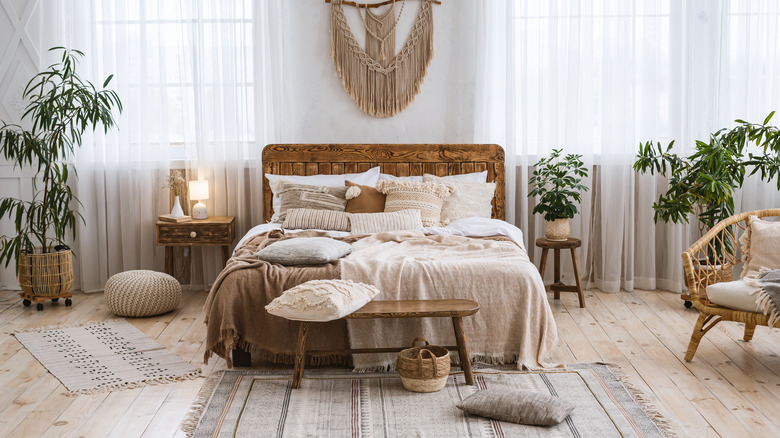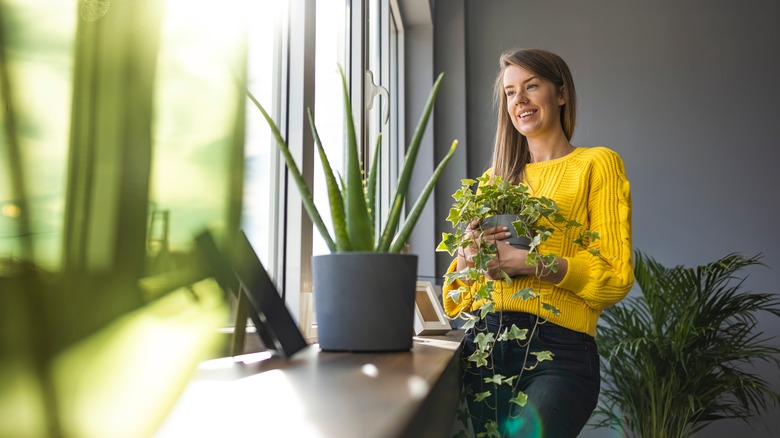The Best Plants To Keep In Your Bedroom
Have you ever wondered why taking a walk almost always can help improve your mood? Even being on a tree-lined street with various luscious greens is enough to help you feel more at peace and happier. One reason why they help is because of the human connection to nature. Even in the most enclosed spaces, plants have the power to make us feel better, even by just looking at them. According to a study published in the National Center for Biotechnology Information, caring for indoor plants can help reduce psychological and physiological stress in humans. Plants also reportedly improve concentration and memory by 20%, according to the University of Michigan. With these overwhelmingly positive health benefits for indoor plants, it's no wonder why people just love buying them.
Since taking a walk isn't always possible, there are ways you can bring these benefits closer to you. Placing plants in your bedroom is one of the best ways you can add more peace and relief to your room. Having plants near where you sleep can also help put you in a better mood when you fall asleep and when you wake up. However, not every plant will work best indoors. You want to ensure that you're not making mistakes with indoor plants and you're picking the right ones for your bedroom that will thrive in an enclosed space so they last longer.
Indoor plants you need to have
Just because you're putting plants inside doesn't mean they need to be fake. According to Casper, the best indoor plants for your bedroom include those that do not need a lot of direct sunlight or high upkeep. One of these plants is the rubber plant. This plant can thrive in moderate to low light and only requires some occasional watering. The rubber plant also helps remove toxins in the air, which is ideal for detoxifying your bedroom. Another perfect bedroom plant is the English ivy plant. This plant needs to be watered regularly but can thrive in moderate light. The English ivy also helps clear the air from mold and animal feces in addition to removing toxins like the rubber plants. These two plants are ideal for bedrooms that may not have plenty of natural light.
If you do get good light in your bedroom, there are more options available. Nectar suggests purchasing a lady palm plant. These plants excel in bright indirect sunlight, meaning you can keep them in the corner of a well-lit room. You only need to water these plants once you notice the top layer of the soil is starting to dry out. The best part of this plant is that it can grow up to 18 inches tall, meaning it's a great statement plant for your room decor. Another plant to put on your radar is the devil's ivy plant. This plant can live near or next to a window on like a side table, but it does need daily watering as well. While it requires more maintenance, NASA recommends this plant after proving it can purify the air.
How to care for indoor plants
Having an indoor plant is fantastic for your health and well-being, but they still require work. While they may require less work than outdoor plants and flowers, there are still some factors to keep in mind.
Better Homes & Gardens recommends watering your plants on an "as-need basis." Depending on the plant, you want to aim to keep the soil moist. While dry plants are no good, you also do not want the plant soil immersed in water as overwatering can also kill your plant. Since you may have your bedroom plants in a pot, you will also want to repot them once the roots have grown. To check if they need repotting, see if the roots are circling your planter and ready for something bigger.
When caring for your bedroom plants, you want to be sure you are taking proper care, or else you will have to replace them. Another precaution to take, according to Almanac, is to use filtered water. While tap water may be easier to get, it could contain minerals and chemicals that are not good for your plant. In fact, certain minerals can cause your plants to brown quickly. You also want to be aware of pests and flies that may surround your indoor plants. Even though they are generally harmless, you still don't want them around so stay ready with natural deterrents, like garlic, to protect your plants from them.


